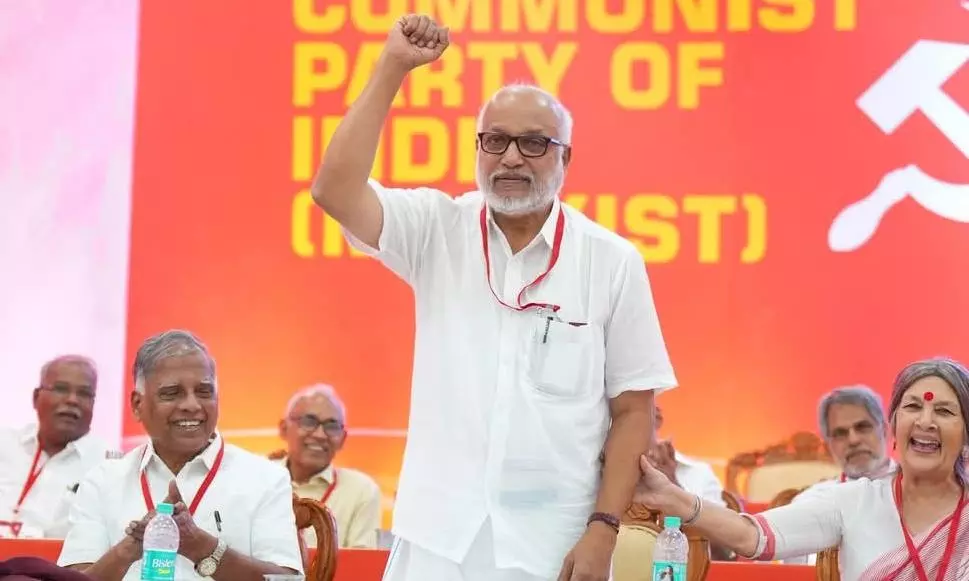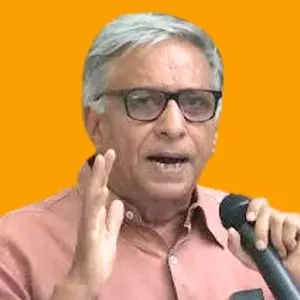
- Home
- India
- World
- Premium
- THE FEDERAL SPECIAL
- Analysis
- States
- Perspective
- Videos
- Sports
- Education
- Entertainment
- Elections
- Features
- Health
- Business
- Series
- In memoriam: Sheikh Mujibur Rahman
- Bishnoi's Men
- NEET TANGLE
- Economy Series
- Earth Day
- Kashmir’s Frozen Turbulence
- India@75
- The legend of Ramjanmabhoomi
- Liberalisation@30
- How to tame a dragon
- Celebrating biodiversity
- Farm Matters
- 50 days of solitude
- Bringing Migrants Home
- Budget 2020
- Jharkhand Votes
- The Federal Investigates
- The Federal Impact
- Vanishing Sand
- Gandhi @ 150
- Andhra Today
- Field report
- Operation Gulmarg
- Pandemic @1 Mn in India
- The Federal Year-End
- The Zero Year
- Science
- Brand studio
- Newsletter
- Elections 2024
- Events
- Home
- IndiaIndia
- World
- Analysis
- StatesStates
- PerspectivePerspective
- VideosVideos
- Sports
- Education
- Entertainment
- ElectionsElections
- Features
- Health
- BusinessBusiness
- Premium
- Loading...
Premium - Events

It appears that Baby will leave the utterly pragmatic Pinarayi Vijayan to manage Kerala as he sees fit, socio-political and economic warts and all
If the devil sits in the detail, it is the power of interpretation of a text that can move rigidities, as the recent flow of politics within the Communist Party of India (Marxist) suggests.
The draft political document prepared for the CPI(M)'s 24th congress, held in Madurai earlier this month, raised apprehensions that the party would plump for the idea of ‘Fortress Kerala — i.e. throw all its energies into the “defence” of the Left Democratic Front (LDF) government in the state, as though it was under pre-meditated attack from hostile corners, and keep some distance from the national scene in which a viable configuration may be attempted to challenge the Modi regime, especially with the Congress playing an active part.
A ‘note’ under the signature of former general secretary Prakash Karat, who was named the Central Committee’s interim coordinator last year to manage the party’s affairs in the run-up to Madurai following the demise of then general secretary Sitaram Yechury, strengthened the impression that the Kerala line was going to be the national line, and Kerala was all that mattered to the party.
Isolation of Left
Although the political document spoke of the need to strengthen Left unity, the note underlined the party’s differences with the Communist Party of India (CPI) and the Communist Party of India (Marxist Leninist), or CPI (ML), which do not hesitate to call the regime “fascist”.
Also read | MA Baby takes over as CPI(M) general secy; can he revive its political fortunes?
This elated RSS-BJP circles, as an Organiser lead article hinted, and the Kerala-centric approach worried many CPI(M) followers and admirers.
The concern was about the possible isolation of the Left as a whole in national affairs at a politically significant current juncture when efforts, even if loosely formulated, are on to challenge Prime Minister Narendra Modi’s BJP, with Congress leader Rahul Gandhi lending ideological heft. (In spite of the Congress’s weakened organisational condition over time, its overall national presence makes many partners uneasy.)
All this appeared so different from the CPI(M)'s orientation under Yechury, who had come to be known for his adaptive efforts in helping bring anti-BJP parties on a common platform. For the CPI(M), the Congress has been the fly in the ointment since the two have struggled for supremacy in Kerala for long.
Kerala factor
With the CPI(M) losing power in West Bengal and Tripura after governing these states for an extended period, Kerala seemed to be all that the party was left with. And this, in a sense, became the party’s ‘red line’ which must not be crossed.
Also read | What’s behind CM Pinarayi’s volte-face on SNDP leader Vellapally Natesan?
Karat appeared more conservative in this regard while Yechury, though conscious of the Kerala factor, was not losing sight of the national focus to not yield to an authoritarian force at the Centre pushing national governance in a far-Right direction, in which the poor and the religious minorities were getting short shrift.
With the CPI(M) losing power in West Bengal and Tripura after governing these states for an extended period, Kerala seemed to be all that the party was left with. And this, in a sense, became the party’s ‘red line’ which must not be crossed.
In this background, senior Politburo member MA Baby emerged the general secretary, overcoming an incipient, behind-the-doors challenge from Ashok Dhawale, a well-liked Politburo member from Maharashtra.
Dhawale has peasant organisation credentials unlike Baby, who has come up the ranks of the CPI(M)’s student and youth organisations and displayed savvy as education and cultural affairs minister in Kerala and as a two-term Rajya Sabha member. Besides, Baby has displayed inner-party negotiating and accommodation skills abundantly.
Baby's 'primary objective'
In the Politburo, many from outside Kerala appeared to be wary of the ‘Kerala line’ and more in tune with the Yechury-era national approach. This made Baby look like a front for Kerala Chief Minister Pinarayi Vijayan and also Karat.
Erroneously, as it turns out.
In a responsible but frank interview with the New Delhi bureau chief of the Malayalam daily Deepika a week after assuming office, Baby underlined that “defeating the BJP and its allies” will be his party’s “primary objective” and expanding the influence of his party and the Left will be the next.
This pretty much places emphasis on the overall national picture and indicates an inclination to align forces with anti-BJP parties nationally. The totality of the interview, in the absence of any authoritative text appearing since the Madurai congress, serves as authentic record and is notable for the breadth of the issues it addresses.
Also read | Why declining 'quality' of membership is a looming crisis for CPI(M)
Marxists and Congress
In response to persistent questions on the dynamics of ties with the Congress, the CPI(M) leader noted that while his party and the Congress vie with each other in Kerala, they both fight the BJP. The issue has rarely been placed in this tenor by a top-ranking communist.
Baby also makes the point that his party has not suffered from “blind anti-Congressism”, citing examples of support to minority Congress governments, starting with Indira Gandhi’s dispensation in 1969.
It appears that Baby will leave the utterly pragmatic Pinarayi, who like some other chief ministers has the reputation of being a “mini Modi” — a 'Modi in a mundu' — to manage the state as he sees fit. This is probably the basis of an understanding between the two.
Ties with Pinarayi
Asked about the Kerala Chief Minister’s endorsement of a “controversial” recent remark of the top SNDP (the party of Kerala’s Ezhava community) leader Vellapally Natesan, who recently said that Kerala's sole Muslim-majority district “seems like a different country”, Baby papered over it, saying it was not the general secretary’s job to comment on the chief minister.
Clearly, the Chief Minister aims to woo the sizeable Ezhava vote in the state Assembly polls next year, no matter that his method may seem opportunistic.
According to the Economic Times, Kerala is also wooing Adani Group investments, with Rs 30,000 crore planned over the next five years, covering a seaport, a renovation of the Thiruvananthapuram airport, a logistics hub and manufacturing operations.
Watch | Brinda Karat interview: Socialism is only alternative to capitalism, loot, American hegemony
Big business outlays to shore up the budget are hardly in line with general communist thinking, but then there is the conceptual rider that there can’t be socialism in one state in a capitalist country.
In the same vein, only last month, the Pinarayi government passed a Bill to permit private universities in the state. There is no such educational enterprise in Kerala at present.
Will Baby show the way?
How will the CPI(M) as a party react to these new turns the state government is taking? Will the party leadership, in particular the general secretary, be deemed answerable?
With Kerala Assembly elections a year away, how severely will the approach to the Congress at the national level be impacted?
Probably, the playing out of power politics and inner-party struggles, if any, will help answer such questions in the future. For now, the arrival of Baby in his new role appears to signal breaking free from narrow confines and aiming at ideological intervention nationally.(The Federal seeks to present views and opinions from all sides of the spectrum. The information, ideas or opinions in the article are of the author and do not necessarily reflect the views of The Federal.)


